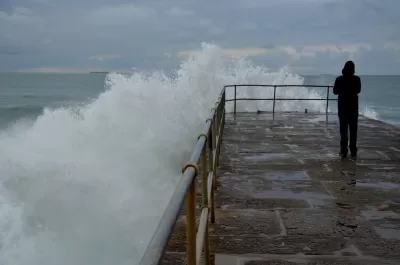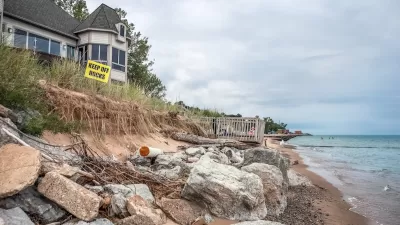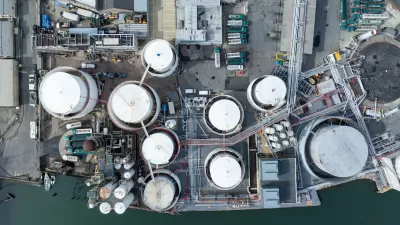A report from Climate Central calls for urgent action, illustrating the potential devastating impact of even a small rise in global temperature on the coastline of major cities.

Even if the world manages to hold climate change down to just a 1.5 degree rise in temperature, reports Ben Adler, the resulting sea level rise will create disastrous conditions in some of the world's major coastal cities. A group of researchers from Climate Central calculated just how much water will rise in cities around the world given a 1.5 degree warming and found that flooding would occur "in and around some key sites."
For example, Santa Monica, California "will lose its beach." Other famous places, such as London's Buckingham Palace, could end up underwater, and "the images of city streets turned to rivers and once-inhabitable buildings sticking out of the water like piers are a striking warning of what may be to come."
Adler reminds us that "[l]ong before an area is actually underwater, it will face regular flooding from heavy rainfalls and storm surges — which are also becoming more frequent and severe because of climate change." Some of the landmarks represented in the study would "have to be abandoned due to rising waters unless dramatic action is taken to save them." Even cities not near the coast would see lasting impacts around the rivers and waterways that connect them to the ocean.
"The consequences of sea level rise will fall hardest in the developing world, where huge populations live in large coastal cities." The report warns that "if greenhouse gas emissions continue at a high level and warming reaches 4°C, '50 major cities, mostly in Asia, would need to defend against globally unprecedented levels of exposure, if feasible, or face partial to near-total extant area losses.'"
The successor to the Paris climate agreement is up for negotiation this November. "Currently, nations have not pledged enough emissions cuts or climate finance to avert the warming scenarios that Climate Central explored, but the organization’s hope is to help spur more aggressive action."
FULL STORY: What climate change and sea level rise will do to American cities

Alabama: Trump Terminates Settlements for Black Communities Harmed By Raw Sewage
Trump deemed the landmark civil rights agreement “illegal DEI and environmental justice policy.”

Planetizen Federal Action Tracker
A weekly monitor of how Trump’s orders and actions are impacting planners and planning in America.

Why Should We Subsidize Public Transportation?
Many public transit agencies face financial stress due to rising costs, declining fare revenue, and declining subsidies. Transit advocates must provide a strong business case for increasing public transit funding.

Understanding Road Diets
An explainer from Momentum highlights the advantages of reducing vehicle lanes in favor of more bike, transit, and pedestrian infrastructure.

New California Law Regulates Warehouse Pollution
A new law tightens building and emissions regulations for large distribution warehouses to mitigate air pollution and traffic in surrounding communities.

Phoenix Announces Opening Date for Light Rail Extension
The South Central extension will connect South Phoenix to downtown and other major hubs starting on June 7.
Urban Design for Planners 1: Software Tools
This six-course series explores essential urban design concepts using open source software and equips planners with the tools they need to participate fully in the urban design process.
Planning for Universal Design
Learn the tools for implementing Universal Design in planning regulations.
Caltrans
Smith Gee Studio
Institute for Housing and Urban Development Studies (IHS)
City of Grandview
Harvard GSD Executive Education
Toledo-Lucas County Plan Commissions
Salt Lake City
NYU Wagner Graduate School of Public Service





























